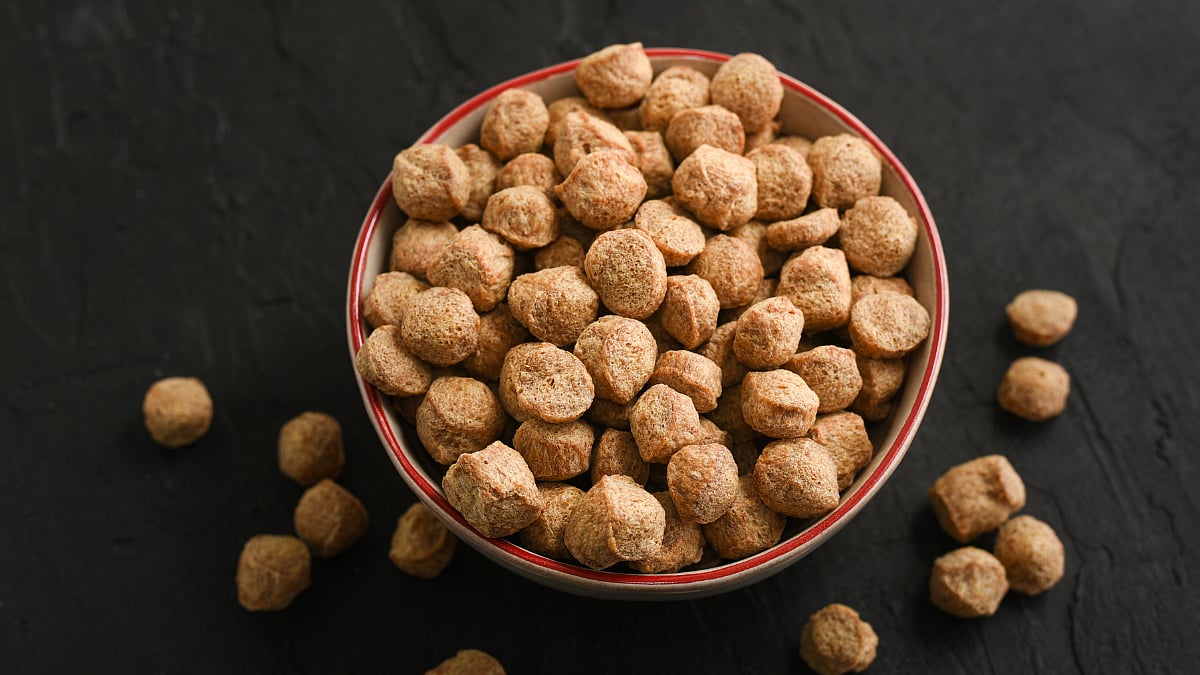In the world of plant-based nutrition, soya beans and soya chunks often go head-to-head as popular meat alternatives. Whether you're a vegetarian looking for protein-rich foods or simply trying to add healthier options to your meals, these two soy-based options often feature prominently. But are they the same? And which is actually better for your health? Let's break it down.

Canva
What are Soya Chunks?
Soya chunks, also known as textured vegetable protein (TVP), are made from defatted soya flour, the residue left after extracting oil from soybeans. This flour is then processed under high pressure and temperature and shaped into small, chewy nuggets that resemble meat in texture. Their versatility and affordability make them a staple in many vegetarian and vegan kitchens.
Health benefits of Soya Chunks:
High Protein Content
Soya chunks are protein powerhouses, containing more than 50% protein. This makes them an ideal food for bodybuilders, athletes, and anyone looking to maintain or build muscle mass. The protein content aids in tissue repair, muscle synthesis, and overall metabolic function.
Low In Fat
With little fat content, soya chunks are suitable for those managing calorie intake. This also makes them a smart addition to heart-healthy diets.
Rich In Dietary Fiber
Soya chunks contain dietary fibre that promotes digestive health. Fibre adds bulk to the stool, supports healthy gut bacteria, and reduces the risk of constipation and bloating.
Supports Bone Health
They contain essential nutrients such as calcium, phosphorus, and vitamin D. Regular consumption can help maintain bone density, which is particularly important for postmenopausal women and the elderly.
Improves Satiety
The combination of high protein and fibre means soya chunks help keep you fuller for longer, making them useful for weight management and reducing unnecessary snacking.
Cholesterol Management
Soya protein has been shown to lower LDL (bad) cholesterol levels, which can support cardiovascular health in the long term.

Canva
What are Soya Beans?
Soya beans are the original, whole-food form of soy. These small, oval-shaped legumes come in various colours (yellow, green, and black) and are a staple in many Asian diets. They can be boiled, roasted, fermented, or processed into products like tofu, tempeh, and soy milk.
Health benefits of Soya Beans:
Nutrient-Rich Profile: Soya beans are one of the few plant-based foods that offer a complete protein profile, meaning they contain all nine essential amino acids. They're also rich in vital nutrients like iron, folate, calcium, potassium, magnesium, and vitamin K.
Heart Health Booster: The high levels of polyunsaturated fats, particularly omega-3 fatty acids, in soya beans help reduce inflammation, improve blood lipid profiles, and lower the risk of heart disease.
Loaded With Antioxidants: Soya beans are rich in isoflavones, a natural plant compound with antioxidant properties. Isoflavones are known to reduce oxidative stress and support hormonal balance and may reduce the risk of hormone-related cancers such as breast and prostate cancer.
Bone Strengthening: Soya beans provide good amounts of calcium, magnesium, and vitamin K, which are vital for bone mineralisation and preventing osteoporosis.
Hormonal Balance In Women: Isoflavones in soya imitate estrogen in the body, making soybeans potentially helpful in managing menopause symptoms like hot flashes and bone density loss.
Weight Management: High fibre and protein content helps control appetite, slows digestion, and maintains blood sugar levels, all of which aid in effective weight control.
Blood Sugar Regulation: The low glycemic index and fibre-rich nature of soya beans help regulate insulin levels and manage diabetes better.
What is the difference?
Processing: Soya beans are natural and unprocessed, while soya chunks are processed after oil extraction.
Nutritional Value: While soya chunks are rich in protein, they may lose some nutrients during processing. Soya beans offer a more well-rounded nutrient profile.
Fat Content: Soya chunks are very low in fat, making them suitable for calorie-controlled diets. Soya beans contain healthy fats that are beneficial for heart and brain health.
Shelf Life: Soya chunks have a longer shelf life and are easier to store, while soya beans require more preparation and shorter storage times.
Dr Smitha Nambiar, MBBS, DipIBLM, Physician & Lifestyle Medicine Specialist, further explains, "Soya beans are the whole, natural legume — rich in protein, fibre, healthy fats (especially omega-3), vitamins like folate, and minerals such as iron, calcium, and magnesium. When used in this minimally processed form, they retain their complete nutrition."
She adds, "Soya chunks are a byproduct of soybean oil extraction. While high in protein, they are processed and may lose some of the nutrients, like healthy fats and certain vitamins. However, they are affordable and have a longer shelf life."
So, which one should you choose?
Dr Nambiar says, "Soya beans are healthier as they are unprocessed and offer a more balanced intake of protein, fibre, and healthy fats."
However, the choice depends on your dietary needs:
Choose soya chunks if you’re looking for a lean, high-protein option to support muscle gain or weight loss.
Opt for soya beans if your priority is balanced nutrition that includes essential fatty acids, vitamins, minerals, and antioxidants.










